 |
|
|
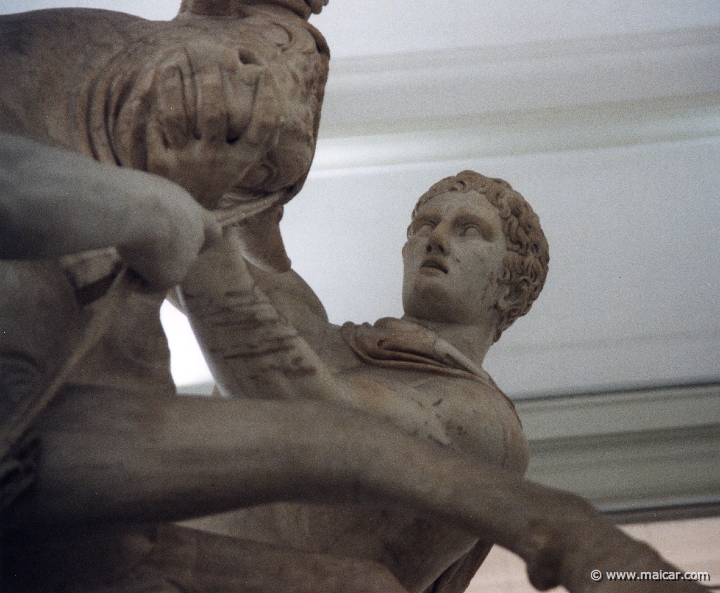
|
Amphion 1, taming the bull that killed Dirce. 7027: "Toro Farnese". Inizio III sec. d.C. Da originale di età ellenistica (detail). National Archaeological Museum, Naples.
|
|
|
"In days gone by the sons of heaven came to the wedding of Harmonia, and the walls and towers of Thebes rose to the sound of Amphion's lyre ..." (Euripides, Phoenician Women 824).
|
|
Amphion 1 and his twin brother Zethus were exposed as infants, but survived. Having met their mother when they were grown up, they avenged her (who had been kept as a slave), and took power in Thebes by force, killing the ruler of the city and his wife. Amphion 1 became then king of Thebes, and since he was a musical genius, the stones followed his lyre when he fortified the city. However, his wife provoked the wrath of Apollo and Artemis, and his house was utterly destroyed.
Nycteus 2, Regent in Thebes
When King Polydorus 2 died, the kingdom of Thebes was entrusted, along with his son Labdacus 1, to his father-in-law Nycteus 2, father of Nycteis, whom Polydorus 2 had married. Yet Nycteus 2 was an outsider, for he and his brother Lycus 5 had fled from Euboea because of the murder of Phlegyas 1, a Boeotian king. First they settled in Hyria, which is in Boeotia, but later they came to Thebes, being enrolled as citizens through their friendship with Pentheus 1. However, they could have been in Thebes from the very beginning, for these brothers are also said to be the sons of Chthonius 2, one of the SPARTI.
Epopeus 1, King in Sicyon
In any case, it was during the regency of Nycteus 2 in Thebes that Epopeus 1, originally a Thessalian, came to power in Sicyon after the death of King Corax, son of Coronus 2, son of Chrysorthe, daughter of Orthopolis, son of Plemnaeus, son of Peratus, son of Calchinia, daughter of Leucippus 5, son of Thurimachus, son of Aegyrus, son of Thelxion, son of Apis 2. This Apis 2 was either son of Phoroneus, the first man, or of Telchis, son of Europs 1, son of Aegialeus 2, the first inhabitant of Sicyon, who was either son of the river god Inachus and the Oceanid Melia, or of Apollo.
First war
Epopeus 1, on becoming king of Sicyon, took as wife a woman, Antiope 3, who had a name in all Hellas for her beauty. But as she was not given to him, he, being a man rich in initiatives, abducted her. Some have said that Antiope 3 was the daughter of the river god Asopus, but others say that she was the daughter of the Theban Regent Nycteus 2 and his wife Polyxo 3. As a result of the abduction of Antiope 3, the Theban army invaded Sicyon, which up to then had enjoyed unbroken peace. In this war, the Thebans were defeated, both Nycteus 2 and Epopeus 1 being wounded in battle. Epopeus 1 neglected his wound and died, and Nycteus 2, who returned to Thebes as a dying man, appointed as his successor, before passing away, his own brother Lycus 5, for Labdacus 1, son of Polydorus 2, was still a child.
|
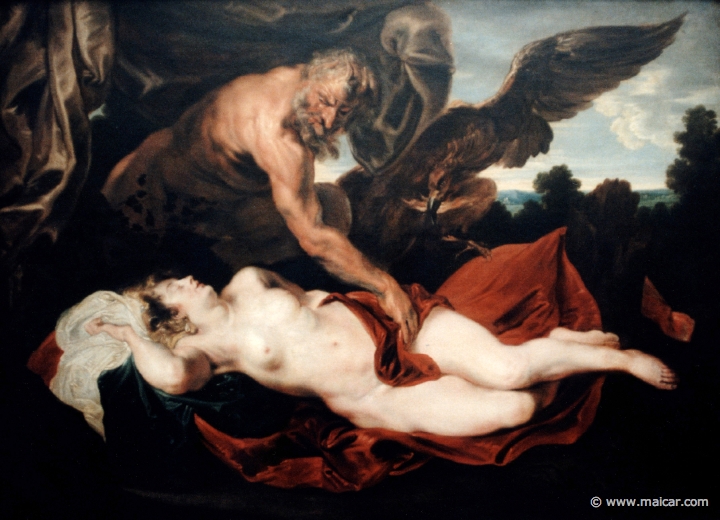
|
Zeus the Satyr approaching Antiope 3. 4014: Antoon van Dyck 1599-1641: Jupiter en Antiope. Museum voor schone kunsten, Gent.
|
|
Children of Antiope 3 by Epopeus 1
Antiope 3 had by Epopeus 1 a daughter Oenope, who, having consorted with Poseidon, gave birth to Megareus 2, the man who later helped King Nisus 1 of Megara in his war against Minos 2. She also gave Epopeus 1 a son, Marathon, who, escaping from the lawless violence of his father, migrated to the sea coast of Attica, and only returned after his father's death, dividing his kingdom among his sons Corinthus and Sicyon, before returning to Attica.
Children of Antiope 3 by Zeus
Antiope 3 bore also two sons to Zeus, Amphion 1 and Zethus, after the god approached her in the form of a Satyr. These two, who were her first children, were conceived in Thebes. For it is also told that her father threatened her for being pregnant, and that it was then that she ran away, seeking Epopeus 1's protection at Sicyon and marrying him. But the children, who were born in Eleurethae in Boeotia, or in some crossroad before she came to Sicyon, were exposed and subsequently found by a herdsman or shepherds, who reared them and gave them the names by which they are known.
Second war
In the meantime, the new Theban Regent Lycus 5 attacked Sicyon once again, this time conquering it and taking Antiope 3 away captive. Some have also said that this girl, before being abducted by Epopeus 1 or running away to Sicyon, had been Lycus 5's wife, and that before she was taken back to Thebes she had given birth to two sons who were not the sons of Epopeus 1, but Zeus' children. Likewise, it is also said that it was Lycus 5 who ended the days of Epopeus 1, during the second war.
Antiope 3 treated like a slave
|
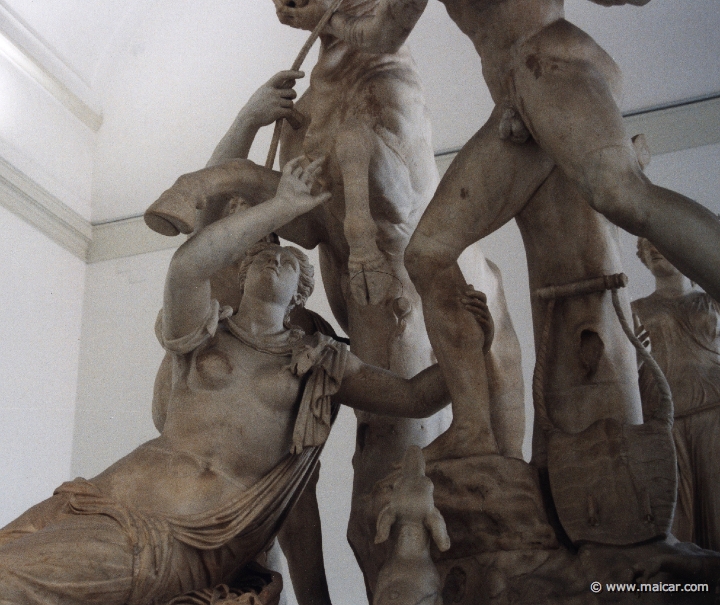
|
Dirce, about to be tied to the bull. 7027: Dirce. “Toro Farnese”. Inizio III sec. d.C. Da originale di età ellenistica (detail). National Archaeological Museum, Naples.
|
|
Lycus 5 and his new wife Dirce, daughter either of the river god Achelous, or of Ismenus 1, after whom the river near Thebes is called, imprisoned then Antiope 3 and treated her spitefully. Dirce hated Antiope 3 because of the rumour that went saying that this girl had slept with Lycus 5. And so she loved to wrench out Antiope 3's tresses and attack her face, besides loading her with heavy tasks, and letting her lie upon the stony ground. Antiope 3 was often left in darkness, and denied water to quench her thirst. However, she escaped one night to the heights of Mount Cithaeron, or of Eutresis (Leuctra), which is close to Cithaeron, and happened to come to her sons cottage, where she begged to be taken in.
The twins seize power
There the brothers recognized their mother, and having gathered an armed force, went to Thebes and slew Lycus 5. His wife Dirce they tied to a bull, to be dragged by the beast and thus find death in many spots. When she was dead, they cast her dead body into the spring which is called after her, either because of her dying there, or because the spring was formed from her body. This is how the two brothers, after eliminating the Regent and the first lady, took over the kingdom of Thebes. Yet, others have said that when Amphion 1 and Zethus were about to kill him, Hermes forbade them, and ordered Lycus 5 to yield the kingdom to Amphion 1. In any case, as Laius 1, son of Labdacus 1, son of Polydorus 2, son of Cadmus, the founder of the city, was waiting his turn to become king, they expelled him from Thebes, and Amphion 1 became king instead.
Last marriage of Antiope 3
Now, when Dirce, a great worshipper of Dionysus 2, was killed, the god punished Antiope 3, and she went mad, roaming all over Hellas. It was then, they assert, that Phocus 4, son either of Poseidon, or of Ornytion, son of Sisyphus, met her and, curing her madness, married her. This is why, they tell, when Antiope 3 and Phocus 4 died, they were made to share the same grave.
Public works
Public works may be said to have been the twins' main interest as soon as they came to power. It was then that Thebes' seven gates with their seven towers were built, being called after Amphion 1's daughters, and the city was surrounded by a wall. For the twins, having come to power violently,
|
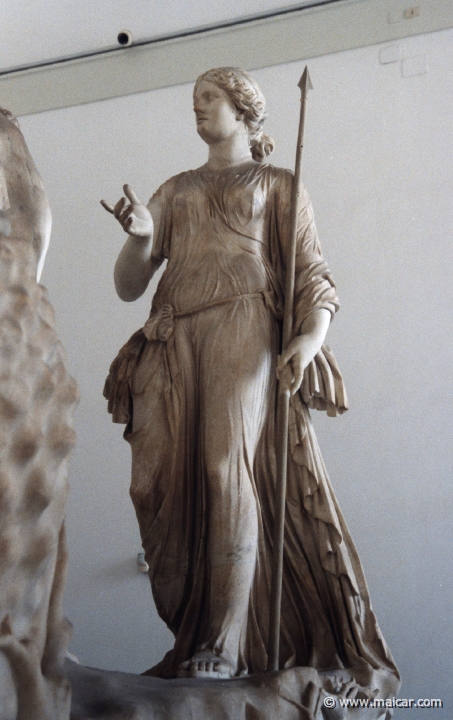
|
Antiope 3, at the hour of vengeance. 7026 detail: Antiope “Toro Farnese”. Inizio III sec. d.C. Da originale di età ellenistica. National Archaeological Museum, Naples.
|
|
"… could not dwell in spacious Thebes unfenced, how mighty soever they were." (Homer, Odyssey 11.265).
But while Zethus had to toil hard lifting the stones, Amphion 1, singing loud and clear while he played on his lyre, made the stones move and follow his music. They also added to Cadmea (for that was the name of the city until then) the lower town, and renamed the city, calling it Thebes, after Zethus' wife Thebe, daughter of the river god Asopus and Metope 1, and twin sister of Aegina, mother of Aeacus.
Musical genius
Amphion 1's extraordinary musical talent made him famous in the whole world. And as his father-in-law was Tantalus 1, who reigned in Asia Minor, he learned from the Lydians what is called in music the "Lydian mode" (which today is equivalent of the white notes on a piano from C to C), and himself added three strings to the four old ones. Some have said that Amphion 1 was the first to set up an altar to Hermes, and that for this reason he received lessons in music from the god, being able later to draw beasts and stones after him, when he played. Yet some have thought Amphion 1 to be a clever magician that caused the stones to build themselves into a wall, just like Orpheus, through enchantments, made animals come to him when he played. They also say that he gave something to his brother-in-law Pelops 1, which the latter buried in an appropriate place, so that it would frighten the horses of cruel Oenomaus 1, when they had their chariot-race.
End of his house
Amphion 1's wife Niobe 2 was, however, not only his blessing but also his curse. For she provoked the wrath of the sweet children of Leto, insulting them and their mother. So Apollo and Artemis came down, and shot with their golden arrows most of their children, known as the NIOBIDS. Thus was the Royal House left desolate by plague, being utterly overthrown. Amphion 1 himself, they say, committed suicide out of grief at the loss of his children. His body was buried opposite to the Northern gate together with his brother's; but his soul, some say, is still being punished in Hades for having made a mockery of Leto and her children. His brother Zethus is said to have died of a broken heart, after his son was killed through some mistake committed by his mother. Thus ended the rule of the twins, and Oedipus' father Laius 1 was restored to the kingdom, not knowing yet how fortunate or unfortunate his own rule would prove to be.
Others with identical name
Amphion 2 is one of the ARGONAUTS. Amphion 3 was a commander of the Epeans (people from Elis) against Troy (see ACHAEANS). Amphion 4 is one of the CENTAURS. Amphion 5 was killed by Aeneas at Troy (see ACHAEANS). Amphion 6 was a defender of Thebes against the SEVEN.
|
| Family |
|
|
|
|
|
|
|
|
|
|
|
|
- Antiope 3 is daughter either of Nycteus 2 and Polyxo 3, or of the river god Asopus. Sometimes it is said that she was married to Lycus 5 and that Epopeus 1 abducted her; at other times, she is said to have left Thebes when her father threatened her because of her pregnancy. Thus she is said to have consorted with Lycus 5, with Zeus, with Epopeus 1, and finally with Phocus 4. She had children by Zeus (Amphion 1 and Zethus) and by Epopeus 1 (Oenope and Marathon).
- Iasus 7 or Iasius 5 ruled in Minyan Orchomenus. He was father of one Amphion, father of Chloris 1, who married Neleus. It is doubtful, however, if this Amphion is Amphion 1.
|
|

Niobe 2
|
|
|
|
|
|
|
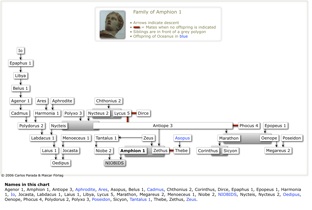
|
Genealogical Charts
Names in this chart: Agenor 1, Amphion 1, Antiope 3, Aphrodite, Ares, Asopus, Belus 1, Cadmus, Chthonius 2, Corinthus, Dirce, Epaphus 1, Epopeus 1, Harmonia 1, Io, Jocasta, Labdacus 1, Laius 1, Libya, Lycus 5, Marathon, Megareus 2, Menoeceus 1, Niobe 2, NIOBIDS, Nycteis, Nycteus 2, Oedipus, Oenope, Phocus 4, Polydorus 2, Polyxo 3, Poseidon, Sicyon, Tantalus 1, Thebe, Zethus, Zeus.
|
|
|
| Related sections |
|
|
|
Sources
Abbreviations |
Aes.Sev.529; Apd.1.9.10, 3.5.5-6; Arg.1.735; Eur.Her.29; Hes.CWE.96; Hom.Il.24.602.ff.; Hom.Od.11.283; Hyg.Fab.8, 11, 69; Ov.Met.6.271; Pau.2.21.9, 9.5.6-8, 9.17.4-6, 9.36.10; Prop.3.15; Stat.Theb.1.10, 2.455; Strab.8.4.4.
|
|
|